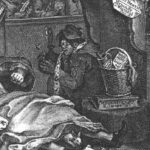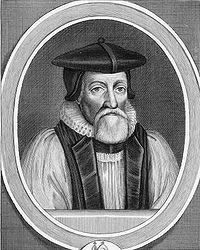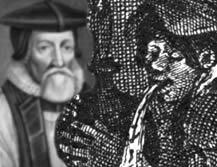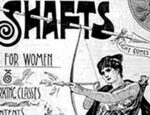Description
 Hear the story of William Perrye, the idle thirteen-year-old boy who feigned Satanic possession in order to avoid going to school, but was unmasked because he had not yet learned Greek. The scene is Bilston colliery town in the West Midlands, in 1620. William, the son of a farmer prosperous enough to send his son to school, frequently ‘practiced a variety of grimaces and contortions, vomited rags and pins’. In these fits ‘he appeared to be both deaf and dumb, writhing, panting, and groaning’. The sure way to induce a fit was to cite the first verse of the Gospel of St. John in his hearing, ‘In the beginning was the word, and the word was with God, and the word was God’. The image by William Hogarth above is called ‘Credulity, Superstition and Fanatacism‘ and shows ‘The Boy of Bilston’ somewhat nonchalantly playing out his fraudulent act of possession.
Hear the story of William Perrye, the idle thirteen-year-old boy who feigned Satanic possession in order to avoid going to school, but was unmasked because he had not yet learned Greek. The scene is Bilston colliery town in the West Midlands, in 1620. William, the son of a farmer prosperous enough to send his son to school, frequently ‘practiced a variety of grimaces and contortions, vomited rags and pins’. In these fits ‘he appeared to be both deaf and dumb, writhing, panting, and groaning’. The sure way to induce a fit was to cite the first verse of the Gospel of St. John in his hearing, ‘In the beginning was the word, and the word was with God, and the word was God’. The image by William Hogarth above is called ‘Credulity, Superstition and Fanatacism‘ and shows ‘The Boy of Bilston’ somewhat nonchalantly playing out his fraudulent act of possession.
 An impoverished old woman named Joan Cox, who lived nearby, was suspected of possessing him. According to a 1622 pamphlet entitled The Boy of Bilston; or, a True Discovery, the Bishop of Lichfield was summoned and ‘thus unmasked the imposture. Once when the boy had recovered from the fit, the Bishop called for a Greek Testament, and said to him, ‘Boy! It is either thou or the devil that abhorrest those words of the Gospel, and if it be the devil, he (being almost 6000 years standing) knoweth and understandeth all languages of the world, so that he cannot but know when I recite the same sentence out of the Greek; if it be thyself, though art a most execrable wretch who playest the devil’s part.’
An impoverished old woman named Joan Cox, who lived nearby, was suspected of possessing him. According to a 1622 pamphlet entitled The Boy of Bilston; or, a True Discovery, the Bishop of Lichfield was summoned and ‘thus unmasked the imposture. Once when the boy had recovered from the fit, the Bishop called for a Greek Testament, and said to him, ‘Boy! It is either thou or the devil that abhorrest those words of the Gospel, and if it be the devil, he (being almost 6000 years standing) knoweth and understandeth all languages of the world, so that he cannot but know when I recite the same sentence out of the Greek; if it be thyself, though art a most execrable wretch who playest the devil’s part.’
 The Bishop then read, in Greek, the 12th verse of St. John, ‘which the boy supposing the first, fell straightway into one of his agonies.’ But when the famous first verse, en archei en ho logos, was read in Greek, he did not recognize it as his customary cue. William was put on trial, but apologized, and his resourcefulness had impressed the Bishop, who hired him as an apprentice. His own career as Diocesan official, or clergyman, was thus secured.
The Bishop then read, in Greek, the 12th verse of St. John, ‘which the boy supposing the first, fell straightway into one of his agonies.’ But when the famous first verse, en archei en ho logos, was read in Greek, he did not recognize it as his customary cue. William was put on trial, but apologized, and his resourcefulness had impressed the Bishop, who hired him as an apprentice. His own career as Diocesan official, or clergyman, was thus secured.
William’s lack of Greek was good news even for the poor old woman, Joan Cox. She may not have leapt up the career ladder, but at least could go back to her impoverished life, cleared of all suspicion of witchcraft.




